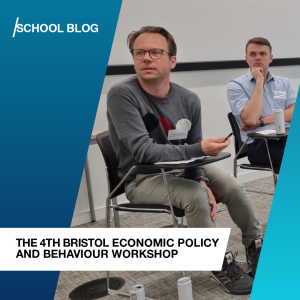 The 4th Bristol Economic Policy and Behaviour Workshop, held on the 18 and 19 of May, brought together prominent economists to delve into crucial topics shaping the field.
The 4th Bristol Economic Policy and Behaviour Workshop, held on the 18 and 19 of May, brought together prominent economists to delve into crucial topics shaping the field.
Hosted by the University of Bristol, the workshop offered a platform to discuss policy evaluations from different sub-fields of applied microeconomics and gain valuable insights.
Highlights of the workshop included the presentation from keynote speaker David B. Huffman from the University of Pittsburgh, who focused on the intriguing relationship between complexity and bounded rationality in organisations.
The policy panel, ‘Exploiting the Potential of Linked Data’, brought together experts such as Chris Shine from the Office of National Statistics, Torben H. Nielsen from the University of Copenhagen, Helen Simpson (Director of the CEPS, University of Bristol), and Richard Davies (Director of the Economics Observatory, University of Bristol). The panel discussed the significance of leveraging linked data for economic research and policymaking, emphasising the potential implications for society.
With its focus on addressing pressing economic issues and exploring behavioural aspects, this workshop served as an invaluable platform for students and academics to gain exposure to cutting-edge research, foster collaborations, and ignite inspiration for future studies.
The complete list of sessions is as follows:
Thursday, 18 May 2023
Ozge Demirci (University of Warwick): Can Gender-Blind Algorithmic Pricing Eliminate the Gender Gap?
Torben H Nielsen, University of Copenhagen: Causal Effects of Early Career Sorting on Labor and Marriage Market Choices: A Foundation for Gender Disparities and Norms
Maddalena Ronchi, Institute for Fiscal Studies: Think-Manager-Think-Male: the role of unconscious discrimination in the workplace.
David B. Huffman, University of Pittsburgh: Complexity and Bounded Rationality in Organizations
Daniel AC Barbosa, University of Oxford: De-escalation technology: the impact of body-worn cameras on citizen-police interactions
Libor Dusek, Charles University Faculty of Law: Swiftness and Delay of Punishment
Maria Balgova, IZA Institute of Labor Economics, Bonn: Wage Information and Applicant Selection
Katharina Brütt, Vrije Universiteit Amsterdam: Pitfalls of pay transparency: Evidence from the lab and the field
Friday 19 May
Sebastian Seitz, University of Manchester: Estimating the Moral Hazard Cost of Private Disability Insurance and its Welfare Consequences
Ingo E. Isphording, IZA Institute of Labor Economics, Bonn: Feedback, Overconfidence and Job Search Behavior
Chris Shine, Assistant Deputy Director at the Office of National Statistics; Torben H Nielsen, University of Copenhagen; Helen Simpson, Director of the CEPS, University of Bristol; Richard Davies, Director of the Economics Observatory, University of Bristol (Chair): Policy Panel – ‘Exploiting the Potential of Linked Data’
Yajna Govind, Copenhagen Business School; To become or not to become French: The consequences of costly naturalization
Bouke Klein Teeselink, King’s College London: Partisanship, Government Responsibility, and Charitable Donations
Keep an eye on our Workshops category for future events like these.

